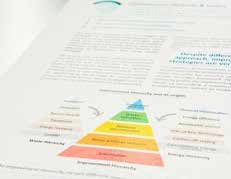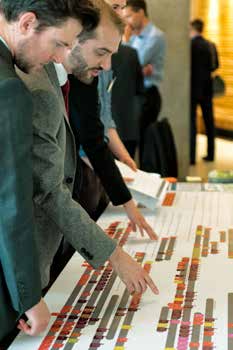Predicting the unpredictable: the future of manufacturing
Dr Dai Morgan from the IfM’s Centre for Industrial Sustainability (CIS) reflects on the UK government’s recent Foresight report on the future of manufacturing.
Predicting the future is a fool’s errand. Ask anyone still holding their breath for mass personal transport in the form of a jet pack, or those who in the 1980s imagined that a portion of the population would be living on moon bases by now. You can pick your individual misstep (how many personal computers would there be a world market for? What about this thing called the internet...?) but it is clearly a tough task for any budding Nostradamuses out there.
|
|
|
Delegates at the EPSRC Centre for Innovative Manufacturing in Industrial Sustainability’s annual conference. |
Yet for those charged with the governance of companies and countries, gazing into an uncertain future and making provision for it is a necessary task. The UK Government Office for Science has a unit for doing just this. In a process known as ‘foresight’, the Office convenes experts to commission and synthesise research in and around particular fields and deliver insight and advice to help the UK government prepare for the challenges of the next 30 to 40 years.
The recent troubles in financial services and the emergence of the first green shoots of re-shoring have encouraged the government to regard manufacturing with increasing favour. It was little surprise, therefore, that it became the subject of the most recently published Foresight exercise. Professor Steve Evans, Director of Research in Industrial Sustainability at the IfM, was one of the nine ‘lead experts’ who spent two years reviewing a mass of evidence from researchers and industrialists from 25 countries to understand what manufacturing in the UK might look like as far ahead as 2050.
Will manufacturing still be important to the UK economy?
A key message to government was that while manufacturing in the UK is never likely to recapture the high levels of employment it once offered – there are now as many graduate-level jobs in manufacturing as there are unskilled labour jobs – it still has a crucial role to play in maintaining the country’s balance of payments and international competitiveness. The report emphasised that an understanding of production is fundamental to successful R&D, design and servicing and will be critical if the UK is to create world-leading innovative products at the right price and quality.
ARM – world leader in semi-conductor IP – is a good example of this. It does not produce the components that are used in vast numbers of smartphones, but its ability to capture value through IP would be fundamentally circumscribed without an intimate understanding of the act of production. Manufacturing isn’t – and never will be – just about making products and selling them.
So what might the future look like?
The report’s authors chose not to make themselves a hostage to fortune by painting a picture of a single future, or even a range of futures. Instead they describe a palette of technologies and forces which will shape and influence the system of manufacturing and the society it serves.
A number of emerging technologies were considered to be particularly important, such as: the use of biotechnology in production processes, additive manufacturing, and the use of sensor systems and big data analysis to gain real-time feedback on the user’s experience.
While none of these ideas is new, their influence is expected to become pervasive and in some combination change the way we manufacture goods and provide services. It is expected that the systems which emerge will be more geographically dispersed, faster and more responsive to the needs of the customer and able to access more customers and markets than ever before.
The less reliant a company’s value chain is on energy, water and key materials, the less sensitive the individual firm will be to key disruptions. The more value it can deliver to the customer, using fewer materials and less energy, the better.
The Foresight report sought input from a range of countries from which a surprisingly consistent picture emerged. One of the key issues they all pointed to was that the search for sustainability would be a major force shaping the future of manufacturing.
Our world is changing around us and the conditions which our children and their families might face will be very different from our own and this will have an impact on the manufacturing system. Water scarcity, security of key raw materials and, of course, climate change were amongst the issues highlighted as having the potential to disrupt manufacturing activities.
While the brunt of climate change impacts are expected to fall first on those least able to cope with the consequences, the global connectedness of manufacturing systems means that those disruptions can easily cascade through to UK operations. Companies that are both resource-efficient and resilient will be able to survive such disruptions; however, those whose operations are competitive and lean but unprepared will be at serious risk.
What will this mean for companies?
For 200 years the manufacturing system has consistently delivered labour productivity. Leading firms are already applying those same productivity tools and techniques to environmental metrics and delivering substantial performance improvements over time, with little or no investment.
The less reliant a company’s value chain is on energy, water and key materials, the less sensitive the individual firm will be to key disruptions. The more value it can deliver to the customer, using fewer materials and less energy, the better.
New technologies, the global competition and the challenges and opportunities of sustainability will drive innovation. So how are companies going to remain competitive while increasing their resilience to disruptions?
To survive, companies will not only need to be increasingly ‘knowledge intensive’ but will also need to understand how to extract value from their knowledge through business model innovation. Selling value rather than ‘things’ through service-based offerings will increasingly become the norm, not just in jet engines and photocopiers as with Rolls-Royce and Xerox, but with a whole range of products that are currently sold by piece or by weight.
Imagine retailers providing a clothing service which allowed you to walk into a store as if it were your personal wardrobe, removing and returning clothes in equal measure. Or perhaps you will no longer own a car, but have a ‘personal vehicle’ on something like a mobile phone contract, where you pay for monthly access to the hardware and a fee for your per-mile usage.
 |
|
Quick guide to sustainable manufacturing practices |
These models focus on what the customer wants and values rather than just on selling products and, if properly designed, they offer the incentive for the companies to make the most of the materials they own, and to minimise energy use in delivering the value to the customer. Such models have the potential to deliver more value, more sustainably.
Alongside the business model, the manufacturing strategy is another competitive weapon that will be subject to new forces. How will we deliver these new business models? How will the potential for disruption affect what gets made where and how we make it? How can resilience be built into supply chains that need to be lean and competitive? Might new technologies enable in-store manufacturing and highly personalised products – the jumper that is literally made to measure or the insole for your trainer that is shaped to your exact specification on the spot?
Many of the trends in business model innovation and resource constriction point towards circular models of production and consumption. Materials will no longer be sent on linear journeys from cradle to grave, but cycled through re-use, remanufacturing and recycling processes. If repair, remanufacturing and recycling become commonplace, would we still ship our raw materials across great distances to be recycled?
Imagine retailers providing a clothing service which allowed you to walk into a store as if it were your personal wardrobe, removing and returning clothes in equal measure.
There is no manual that provides the answer to any of these questions. So, amongst all this uncertainty, there is one thing we can be reasonably sure of: over the next two decades we will see manufacturers experiment with radically new ways of doing business.
How is this shaping our research agenda?
It goes without saying that industrial systems are complex. Our job is to try to understand how future industrial systems might be organised and if they are capable of delivering sustainable outcomes for businesses and society as a whole.
Research in many of these areas is under way. At the IfM we are fortunate to have a number of colleagues who are already studying some of the influential technologies and paradigms highlighted in the report. From research on bio-diagnostic sensors to additive manufacturing technologies, such as inkjet printing and laser assisted cold spray, researchers are seeking to characterise and understand the potential of these new technologies. Alongside them, we also have research centres investigating the development and the emergence of industries and the implications for supply chain and industrial policy.
What we need to do now is adopt a pragmatic approach to the study of industrial systems which can combine innovative research with rapid experimentation in practice. This challenge will require not only deep technical competences, but an ability to integrate knowledge across a range of disciplines from material science to supply chain management and behavioural psychology. Eventually this understanding will lead to better modelling of the industrial system, which will allow companies and academics to improve the speed and quality of experimentation.
It is not just academia which will need to be more joined up to meet the challenges ahead. Indeed, one of the key recommendations from the Foresight report is that the government should set up a Government Office for Manufacturing. In the same way that the Government Office for Science provides a home in government for the science, so the manufacturing office would be responsible for creating systemic views of the issues and making them accessible to everyone from the Treasury to DEFRA and DECC.
 |
|
Dr Dai Morgan |
If the participants in the industrial system are to deliver a more holistic response to the changing demands of the global population, caring for economic, environmental and societal considerations, then an unprecedented degree of coordination and collaboration between government, industry, academia and society will be required. Although the future remains stubbornly unpredictable, we all have a part to play in shaping it – for good or ill.
The Centre for Industrial Sustainability is a research partner in the EPSRC Centre for Innovative Manufacturing in Industrial Sustainability, along with Cranfield University, Imperial College and Loughborough University.










